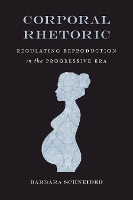


|
|
|
books
| book details |
Corporal Rhetoric: Regulating Reproduction in the Progressive Era
By (author) Barbara Schneider

|
| on special |
normal price: R 2,318.95
Price: R 2,202.95
|
| book description |
Examines public discourse from the Progressive Era over the state's right to regulate women's bodies and their reproduction When Justice Oliver Wendell Holmes determined in 1927 that sterilization was a legitimate means of safeguarding the nation's health, he was asserting the state's right to regulate the production of the national body. His opinion represented a culmination of arguments about reproduction and immigration that had been circulating for years but that intensified during the Progressive Era. Arguments about reproductive and immigration practices surged to the foreground, and tectonic shifts in the conceptual schemes and practices of reproduction in the United States followed. Â Drawing on feminist historiography and genre studies, Corporal Rhetoric: Regulating Reproduction in the Progressive Era explores the rhetoric of medical research, new technologies, and material practices that shifted the idea of childbirth as an act of God or Nature to a medical procedure enacted by male physicians on the bodies of women made passive by both drugs and discourse. Barbara Schneider considers how efficiency, the hallmark of scientific management, was raised to a cardinal virtue by its inclusions in the powerful mediums of presidential speeches, national educational policies, and eugenics discourse to reclassify babies, long regarded as gifts, as either valuable assets or defective products. Â Schneider shows how the legal system drew upon medicine, scientific management, and the emerging discipline of sociology to restrict women's labor in order to preserve reproductive capacity, categorized by Supreme Court opinions as a public good rather than a private capacity. Throughout, she ties the arguments developed during this era to current debates about mothering rhetorics, reproductive rights, immigration, and conceptions of the nation. Â By weaving together medical research reports, clinical practices, case studies, legal opinions and legislative acts, and the epistemology of scientific management, Schneider illuminates the network that women such as Margaret Sanger, Jane Addams, Lillian Gilbreth and multiple others negotiated as they sought to give women room to exercise their reproductive capacity. Through her analysis of the machinery of these discourses and the material uptake of their genres in the daily practices of reproductive bodies, Schneider offers a provisional theory of corporal rhetoric that begins to answer the call for a new material theory of the body.
| product details |

Normally shipped |
Publisher | The University of Alabama Press
Published date | 30 Aug 2021
Language |
Format | Hardback
Pages | 264
Dimensions | 231 x 154 x 25mm (L x W x H)
Weight | 545g
ISBN | 978-0-8173-2095-9
Readership Age |
BISAC | language arts & disciplines / rhetoric
| other options |

Normally shipped |
Readership Age |
Normal Price | R 2,401.95
Price | R 2,281.95
| on special |
|
|
|
To view the items in your trolley please sign in.
| sign in |
|
|
|
| specials |
|

|
André Alexis
Paperback / softback
176 pages
was: R 280.95
now: R 252.95
|
A pack of dogs are granted the power of human thought - but what will it do to them? A surprising and insightful look at the beauty and perils of consciousness.
|
Our moment has seen the resurgence of an anarchist sensibility, from the uprisings in Seattle in 1999 to the Occupy movement of 2011.
|

|
Carl Morrow
Paperback / softback
160 pages
was: R 320.95
now: R 288.95
|
In this uniquely Southern African book, Carl Morrow and Keith Kirsten guide readers step by step into the magical realms of bonsai as a hobby, horticultural practice and art form.
|
|
|
|